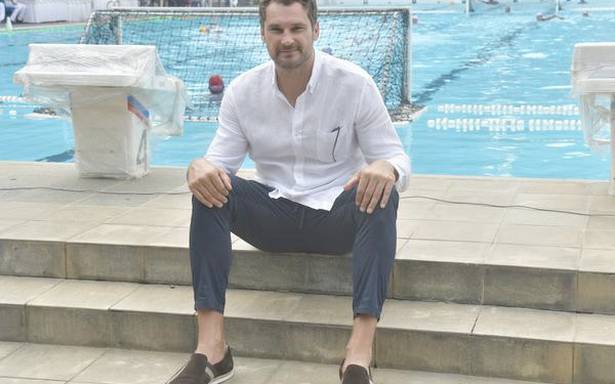Ropes in Serbian double-Olympic medallist Slobodan Soro to kick-start the effort
The last time India was a force to reckon with in men’s water polo, at least at the Asian level, was in the 1970s. After a gold in the inaugural Asian Games in 1951, it claimed silver in 1970 and bronze in 1982.
But since then, the sport has been on a steady decline. The men haven’t participated at a single Asian Games since 1986. The women featured in the 2010 edition and finished fourth out of four teams, conceding 96 goals in three matches.
The Swimming Federation of India (SFI) has thus solicited help from a Serbian Olympic hero, Slobodan Soro, who won bronze at 2008 Beijing and 2012 London, to set India on the path towards redemption.
“The level is low, I understand the situation,” says Soro, who is in the city to help scout talent at the ongoing Senior Nationals, ahead of the 2022 Asian Games.
“Infrastructure is not that good. There are not many heated pools in India, which is one of the basic things. But I see they are really enthusiastic. With some better conditions, the level of players, coaches and referees can all go up.”
Water polo, though eye-catching, is demanding. Players can neither touch the floor nor hang on to the side walls, which means constant pedalling to just stay afloat. Then come the passing, synchronous team moves etc.
Unique sport
“It’s a unique sport. Different muscle groups are used during different times. Even your Javelin champion [Neeraj Chopra] will find it tough to throw the ball more than 10m.”
Ahead of the 2016 Rio Olympics, Soro became a naturalised Brazil citizen and was a goalkeeper in the host’s team that finished eighth. “I have some experience of trying to develop the game. We managed it in Brazil. After winning the first three Olympic games, all Brazilians were talking about water polo.”
“But Brazil already had sports clubs with water polo. In India we need to make the base bigger, because you need quantity and quality.”
The 42-year-old also points to the need for heroes. “I started playing after watching [erstwhile] Yugoslavia win Olympic gold in 1984 and 1988 and World Championship in 1986. Team sports have more influence on society. We have [Novak] Djokovic, but when our basketball or water polo teams win, it makes more impact.”
Monal Chokshi, the secretary general of SFI, concedes that water polo and diving have been given “second-hand treatment,” and calls this engagement with Serbia, “a starting point.”
“We are also looking at parallel development of coaches and refereeing. We are far behind in these sports. There is a lot to do.”
Source: Read Full Article

